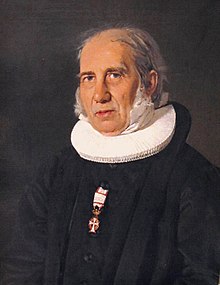N.F.S. Grundtvig
|
The Reverend N. F. S. Grundtvig |
|
|---|---|

Grundtvig in pastoral garments
|
|
| Born |
8 September 1783 Udby, Zealand, Denmark |
| Died | 2 September 1872 (aged 88) Copenhagen, Denmark |
| Occupation | Lutheran minister, teacher, author, poet, philosopher, historian |
| Children | Svend Grundtvig |
Nikolaj Frederik Severin Grundtvig (Danish pronunciation: [ˈneɡolajˀ ˈfʁæːˀðʁæɡ ˈsɛvəʁin ˈɡʁɔndvi]; 8 September 1783 – 2 September 1872), most often referred to as N. F. S. Grundtvig, was a Danish pastor, author, poet, philosopher, historian, teacher and politician. He was one of the most influential people in Danish history, as his philosophy gave rise to a new form of nationalism in the last half of the 19th century. It was steeped in the national literature and supported by deep spirituality.
Grundtvig holds a unique position in the cultural history of his country. Grundtvig and his followers are credited with being very influential in the formulation of modern Danish national consciousness. He was active during the Danish Golden Age, but his style of writing and fields of reference are not immediately accessible to a foreigner, thus his international importance does not match that of his contemporaries Hans Christian Andersen and Søren Kierkegaard.
Called Frederik rather than Nikolaj by those close to him, N. F. S. Grundtvig was the son of a Lutheran pastor, Johan Ottosen Grundtvig (1734–1813). He was brought up in a very religious atmosphere, although his mother also had great respect for old Norse legends and traditions. He was schooled in the tradition of the European Enlightenment, but his faith in reason was also influenced by German romanticism and the ancient history of the Nordic countries.
In 1791 he was sent to Thyregod in Sydjylland to live and study with pastor Laurids Svindt Feld (1750–1803). He subsequently studied at the Aarhus Katedralskole, the cathedral school of Aarhus, from 1798 until graduation. He left for Copenhagen in 1800 to study theology and was accepted to the University of Copenhagen in 1801. At the close of his university life, Grundtvig began to study Icelandic and the Icelandic Sagas.
...
Wikipedia
